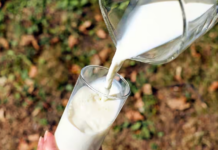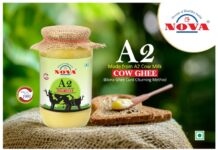Dubai, May 07, 2020: During the holy month of Ramadan, when the time for iftar arrives, you want to indulge in the main meal of soup, appetizers, stews or meat products. You might skip or eat fewer dairy products at this meal unless you take care.
Dairy products include milk, yogurt, labneh, cheese and kefir. The recommended daily intake of dairy is three servings. An example could be one cup of milk, one cup of yogurt and a 30g serving of hard cheese.
Why dairy?
Dairy products provide essential vitamins and minerals including phosphorus, potassium, protein and calcium. It provides the easiest, fastest and most bioavailable way to get your daily recommended intake of calcium.
A cup of milk contains 243mg of calcium that is easily absorbed by the body. Around 30 to 40 percent of the calcium in milk and cheeses is absorbed.
The calcium content in other kinds of food such as dark green vegetables, specifically a cup of cooked spinach, is 115 mg. However, only 5 percent of spinach calcium is absorbed as spinach contains a high proportion of oxalates and phytates, which bind calcium making it less available.
This is why we mostly recommend dairy products or fortified foods as sources of calcium. Kale, watercress, beans and tofu are other calcium sources. Again, watch out for bioavailability according to the reports published in zawya.com.
Are you wary of milk?
Some people have a problem digesting milk or are even lactose intolerant. When they drink milk, they feel bloated and constipated, they might get headaches, stomach aches or diarrhea.
If you are allergic to casein you should not eat dairy products at all because an allergy is different from intolerance.
Tips for lactose intolerant people:
- Hard cheeses have very little or no lactose
- Yogurt has probiotics that aid digestion
- You could opt for lactose-free milk or non-dairy milks such as soy, coconut, almond, oat, rice, hemp. Buy those that are fortified with calcium.
Full-fat or non-fat?
Dairy provides us with proteins, namely casein and whey, and it is important for building muscle mass, for growth and for cell regeneration. It also provides us with carbohydrates for energy, and with fats.
The fats in dairy are saturated fats. If you are a healthy person, if you want to maintain your weight, or even if you are diabetic, I recommend you take whole-fat dairy products. If you have a high cholesterol level, or if you are on a weight loss program, then I recommend low-fat or non-fat products.
Randa’s Recommendations:
- Have a cup of yogurt at iftar
- Include a slice of cheese in your salad
- Prepare your salad dressings using a yogurt base
- Yogurt with mint, cucumber and garlic is a super healthy mix
- Have a cup of milk as a snack or at suhoor. Why not try a milk chia pudding or cheese toast?
Chia pudding is a simple no-bake, high-calcium, high-protein suhoor dish. Here’s a recipe:
Cocoa chia pudding
Ingredients (serves five):
1.5 cup milk
2 cups cottage cheese
2 tbsp chia seeds
1 tbsp honey
2 tsp cocoa
1 tsp vanilla
Instructions: Place all ingredients in a jar. Shake very well. Allow to set in the fridge overnight.

























